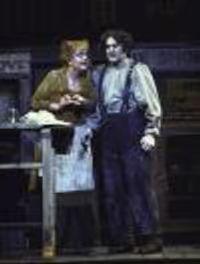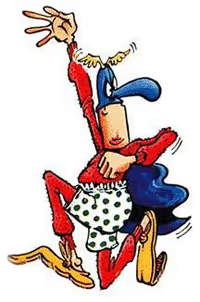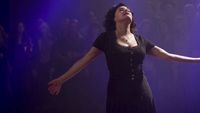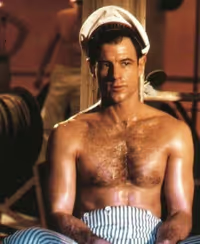GAG ME WITH A RAZOR: Why I Hate Tim Burton's SWEENEY TODD
#75re: GAG ME WITH A RAZOR: Why I Hate Tim Burton's SWEENEY TODD
Posted: 1/23/08 at 8:53pm
I'm afraid that this has to stop here Oliver.
Fine, you didn't like the movie. Many people hold that opinion. I'm pretty sure there's a "Sweeney Movie Review Thread" somewhere on this board.
Just because you didn't enjoy this film, doesn't mean you should go and write an essay about it, not to mention, including extremely stupid reasoning as to your "hatred" of the film.
It's called an opinion. It's great to hear you have one.
#76re: GAG ME WITH A RAZOR: Why I Hate Tim Burton's SWEENEY TODD
Posted: 1/23/08 at 9:04pm
Why should it stop here? I don't agree with a lot of what he writes, but I see no reason for him to stop.
Besides, I'm still waiting for a response to my first post in the thread.
#77re: GAG ME WITH A RAZOR: Why I Hate Tim Burton's SWEENEY TODD
Posted: 1/23/08 at 9:06pmSomeone needs a hobby.
#78re: GAG ME WITH A RAZOR: Why I Hate Tim Burton's SWEENEY TODD
Posted: 1/23/08 at 9:11pm
Hihi... It's so cute...
As if you hold the only true truth.
let me tell you, in musical, there's not one way. You hate the movie because it's not the stageshow. Strange way. Then just don't see it again. I have to say that I'm proud of you that you at least gave it a try.
The dutch release isn't untill the 13th of february. I hope to catch the movie next week when I'm in London.
#79re: GAG ME WITH A RAZOR: Why I Hate Tim Burton's SWEENEY TODD
Posted: 1/23/08 at 11:45pm
you do realize you repeated yourself numerous times and therefore don't have as many reasons as claimed, right?
And I enjoyed it, I think not having seen the show first aided to that, but we're all entitled to our opinions. I'm glad you can at least back yours up, better than some others.
Cages or wings? Which do you prefer? Ask the birds. Fear or love, baby? Don't say the answer Actions speak louder than words. (Tick, Tick... BOOM!)
#80re: GAG ME WITH A RAZOR: Why I Hate Tim Burton's SWEENEY TODD
Posted: 1/24/08 at 8:53amI liked it.
#81re: GAG ME WITH A RAZOR: Why I Hate Tim Burton's SWEENEY TODD
Posted: 1/24/08 at 9:29am
" I hope my remarks will not spoil anyone's pleasure in enjoying Tim Burton's Sweeney Todd. But I also hope they will give courage and solace to people who did not like it, and who have been afraid to express their opinion due to the overwhelmingly positive response to this movie."
For real?
Oliver Brownlow
Chorus Member Joined: 3/15/04
#82re: GAG ME WITH A RAZOR: Why I Hate Tim Burton's SWEENEY TODD
Posted: 1/25/08 at 12:20am
I want to write a little about Quentin Crisp, because several people objected to the way I invoked his name in my initial post.
I called Crisp "notorious" because he referred this way to himself. "I am not famous," he used to say, "I am notorious."
There was a story he liked to tell to illustrate this about a teenage girl who requested his autograph, and who, once he had given it to her, said, "I haven't made up my mind whether to show this to my mother or not."
"She was going to save it until her darkest hour," Crisp speculated. "When her mother says, 'You use this house as a hotel, you dress like a harlot, you do nothing that your father and I wish,' she's going to say, 'Mother, you don't know the half of it -- I've met Quentin Crisp!'"
Crisp's effeminacy was an essential part of his public persona, as was his homosexuality. He discussed both topics with complete candor in his autobiography, THE NAKED CIVIL SERVANT, and in his many other writings and public appearances for the rest of his life.
I don't believe Crisp would have liked to have been called a revolutionary. He called politics "the art of pretending that the inevitable is the result of wise human choice," and thought that people ought to demand to be treated well not on the basis of being one of many, all of whom are the same, but on the basis of being unique individuals. He was tempermentally conservative, in fact, and sometimes irritated younger, more militant gay rights activists by failing to be "politically correct." But in his own quiet, polite, eccentric way, Crisp was a gay rights pioneer of almost unbelievable bravery, "out" and proud at least three or four decades before the Wolfenden Report and the Stonewall riots ignited the modern gay rights movement.
Although he made a number of appearances as an actor on stage and screen, sometimes in female drag, he was not very serious or ambitious about acting and I don't think he ever referred to or thought of himself as a professional actor. He liked to say, instead, that he was in "the profession of being." According to another of Crisp's frequently-told stories, shortly after he began doing his one-man show AN EVENING WITH QUENTIN CRISP (in which he told autobiographical anecdotes during the first half and answered audience questions during the second half), the manager of the theater was asked why Crisp was being permitted to occupy the stage without an Equity card, and he replied, "Mr. Crisp is not acting. He's very sincere."
I'm afraid that some of you are under the misapprehension that I think effeminacy and homosexuality are bad things in themselves, and that my mention of them in connection with Quentin Crisp somehow denigrates him. Nothing could be further from the truth. I greatly admired Quentin Crisp for his courage, wisdom, and humor, and he has been a touchstone for me throughout my life. I see nothing wrong with effeminacy or homosexuality in themselves, and the point of my comparison was to object to Johnny Depp's effeminate-seeming hairstyle in the film not because effeminacy is bad, but because it is inappropriate for the character of Sweeney Todd. And even there, I think a certain kind of much, much subtler effeminacy could serve the character of Sweeney Todd very well.
Quentin Crisp called his unusual personal appearance, which included a womanish hairstyle dyed bright red in the first half of his life and purple in the second half, a leaflet thrust into the hand of passersby. It was not enough, he said, to be noticed. He wanted to be recognized.
Should a character who's supposed to be a fugitive from justice, trying to keep a low profile to avoid being recaptured by the authorities also be shoving a leaflet into the hands of passersby by wearing a hairstyle so weird and so instantly identifiable that it demands he be noticed and recognized?
#83re: GAG ME WITH A RAZOR: Why I Hate Tim Burton's SWEENEY TODD
Posted: 1/25/08 at 12:32amSeriously, bird watching. something.
roquat
Broadway Legend Joined: 5/25/05
#84re: GAG ME WITH A RAZOR: Why I Hate Tim Burton's SWEENEY TODD
Posted: 1/25/08 at 12:44amIf you can't take it, don't read it.
#85re: GAG ME WITH A RAZOR: Why I Hate Tim Burton's SWEENEY TODD
Posted: 1/25/08 at 1:19am
"I want to write a little about Quentin Crisp, because several people objected to the way I invoked his name in my initial post."
Actually, not several. Just me. Don't get paranoid now. I'm the only who's against you and trying to destroy you. ![]()
In fact, a couple people defended you against my besmirching of your reputation. I was outnumbered!
And in fact I immediately told your first defender, husk_charmer, that he or she was probably right.
Although I still don't love the way you expressed yourself. (You know what it's about: you can call me a fag when we're alone, but I might not like it if you did in public.)
Not that Crisp didn't revel in being notorious. In fact, I suggested instead that I would have preferred "the late, notoriously flamboyant and effeminate gay revolutionary."
And even if he might not have liked being called a revolutionary, he nonetheless was one.
Really, it's nice of you to go on and on in tribute to Quentin Crisp, but I don't know why you felt compelled to do it. I'm the only one who questioned what you wrote, and I clearly already know a great deal about him.
Anyway, of course, I didn't really besmirch your reputation. ![]() All I wrote was, "I'm sorry but I do find this description offensive. Without wanting to accuse you of homophobia, I find myself hard put not to read homophobia into this description." Clearly an invitation for you to deny any homophobia and make us all happy.
All I wrote was, "I'm sorry but I do find this description offensive. Without wanting to accuse you of homophobia, I find myself hard put not to read homophobia into this description." Clearly an invitation for you to deny any homophobia and make us all happy.
So really I do think that you overreacted just a trifle.
And I really don't think it's hugely important to the matters being discussed in this thread whether it's accurate to refer to Crisp as having been an actor.
On to more important matters, young master Brownlow!
I don't particularly like the hair style thing in Sweeney myself, but the truth is that the script of the show is filled with implausibilities. The film does add several more implausibilities, and I think they're a problem. It seems to me that among the least of those is Sweeney's hair.
Seriously, if we're supposed to believe that both the Judge and the Beadle don't wonder whether this barber in the same place where Benjamin Barker used to live might not actually be Benjamin Barker—can he have changed THAT much?—then the hair style is of little importance.
If anything, it might be taken as a disguise.
I'm not sure that we're supposed to view it realistically anyway.
Updated On: 1/25/08 at 01:19 AM
#86re: GAG ME WITH A RAZOR: Why I Hate Tim Burton's SWEENEY TODD
Posted: 1/25/08 at 1:34am
"...bloodless..."
WTF?!?!?!
There was heaps of blood. It didn't look real, but there was plenty of it...
#87re: GAG ME WITH A RAZOR: Why I Hate Tim Burton's SWEENEY TODD
Posted: 1/25/08 at 1:43amI hope that's a joke, dramarama2, and that you do know what he means by "bloodless."
#88re: GAG ME WITH A RAZOR: Why I Hate Tim Burton's SWEENEY TODD
Posted: 1/25/08 at 2:53amOliver, I've enjoyed reading your posts here. If others can't take your criticism of the film, tough sh!t for them. I too disliked the film. Not because I expected the stage show, but because it wasn't a well-made movie. In my opinion.
Vita, dulcedo, et spes nostra
Salve, Salve Regina
Ad te clamamus exsules filii Eva
Ad te suspiramus, gementes et flentes
O clemens O pia
#89re: GAG ME WITH A RAZOR: Why I Hate Tim Burton's SWEENEY TODD
Posted: 1/25/08 at 4:05am
I missed part of this, but what does Mr Crisp have to do with anything?
I've only seen the movie once and I loved it. It'll take me a few more views to start picking out its flaws.
Oliver Brownlow
Chorus Member Joined: 3/15/04
#90re: GAG ME WITH A RAZOR: Why I Hate Tim Burton's SWEENEY TODD
Posted: 1/26/08 at 1:12am
nobodyhome has replied:
"A couple of questions about what you wrote: 'Now, I didn't have high expectations for anyone playing this role because the performance tradition, keying from Len Cariou's interpretation on Broadway, has been to play the role as emotionally rigid. I don't happen to agree with that tradition -- I think the role and the play (and movie) would be about a thousand times more interesting if the actor playing Sweeney played him as emotionally dynamic and considered the character's actual intentions, state of knowledge, and probable human reactions at any given moment.' Could you expand on this? I would not describe Cariou's performance as having been 'emotionally rigid,' but it may be more a matter of terminology than a disagreement. I'm not sure if you're basing your description just on the original cast recording or on other 'archival preservations' as well. I know you're too young to have seen him and IIRC you also didn't see him in the fully staged concert in London in 2000 (although 'emotionally rigid' would have applied a little more to his performance in London)."
"In fact, I do think 'emotionally dynamic' would be a good description of his performance on Broadway, especially as the run went on and he found more and more layers and levels. I can't imagine an actor finding Sweeney's 'probable human reactions' more than Cariou did."
"Well, I'll amend that. I can imagine a few places where another actor could effectively bring a bit more variation to Sweeney's outward emotional reactions, but overall not very many. At least not without resorting to indicating and overacting."
"And could you discuss in a little more detail how you would prefer to see the role played?"
As you have more-or-less correctly guessed, I know Cariou's performance chiefly from the Original Broadway Cast Album, though I did see him re-create a performance from the show on TV once, and of course I've seen still photographs of him in the role. So my knowledge of exactly what Cariou did, especially physically, is admittedly limited. And of course a lot of the dialogue is also omitted on the album. But I've seen him in various film and television roles including A LITTLE NIGHT MUSIC, and I also saw him on THE MERV GRIFFIN SHOW in 1979 talking about the show and his performance and singing "Nothing's Gonna Harm You" (!), so putting two and two together I feel I have at least a general sense of what his physical performance may have been like.
I once appeared in a production of SWEENEY TODD with a guy who was acquainted with Stephen Sondheim, and who said that according to Sondheim, some performances of Cariou in the role had been video-taped. He also said that Sondheim had promised to give him a copy of one of these taped Cariou performances (if and when he could find them), but that he said there wasn't a dime's worth of difference between Cariou's performance and Hearn's. This was pretty shocking to me, because I think there's a world of difference between Cariou and Hearn.
In fact, Cariou's performance on the album is different from everyone else's that I've seen or heard. His Sweeney seems warmer and more vulnerable, more appealing and sympathetic. He had also had experience playing Shakespearian roles, and he brings something of a Shakespearian vocal technique to Sweeney at times. That can be a little distancing, but it also lends the proceedings an aura of classical tragedy that fits the play very well. And he has a very pleasant, relaxed Broadway baritone voice that is nonetheless capable of summoning strength and fire when necessary. He's still the best Sweeney Todd I know about. But in spite of the unique subtleties Cariou brought to the role, he also seems to have established the basic template for later interpretations -- that is, Sweeney as a guy who arrives in London angry and seeking revenge, but emotionally burnt out, capable of expressing only about three genuine emotions: anger, more anger, and neutral.
Whether I'm right about thinking that this was a feature of Cariou's performance on stage or not, or whether this developed as a result of people trying to copy what he did and not being able to reproduce all the nuances, or whether people have taken their cues more from the video of the Broadway touring company with George Hearn and/or simply from the surface of the text is something I can't know for sure. As to Cariou's performance, I bow to a knowledge which is apparently far greater than my own. Your remarks about it only make me wish all the more that I could have seen it myself, especially toward the end of the run.
But Cariou is actually beside the point. Every other Sweeney Todd I've ever seen has lacked the subtle good qualities of Cariou's, and only reproduced the emotional constipation. In the stage show, of course, Sweeney literally rises from his grave during the opening number, and people seem to take that a bit too seriously, playing him as a walking corpse. The traditional whiteface horror makeup only exacerbates this problem. He seems already to intend to become a serial killer the moment he arrives in London. Though he yells when told about his wife being raped, there's no emotional change, and though he says that for fifteen years he's been dreaming of coming home to them, he seems already to have known what happened to Lucy and Johanna. He doesn't seem really to have been looking for them with the expectation of finding them. He was angry before and now he's more angry. And the whole show is generally like this.
What I'd like to see instead is a Sweeney who doesn't telegraph every single second of the show that he's angry and he's going to kill people. Ideally, I would like to dispense with the horror makeup except (if it can be applied and removed quickly enough) in the opening and closing scenes (the Ballad and Ballad finale, when he's actually dead). I would like him to look as normal and unthreatening as possible -- neat in appearance, genial, humble, and maybe even friendly. Like a real barber. Like someone you might actually feel comfortable with in real life, someone in whose chair you might really sit down and not be afraid to loosen your collar and allow him to apply a straight razor to your neck. To me, a guy who looks completely normal and trustworthy but then cuts your throat unexpectedly is much more frightening than someone who looks like a ghoul to begin with.
After that there are two main issues. First, I would like to see Sweeney react in the moment as though events are happening to him NOW and he's not just a corpse re-enacting his own tragedy; secondly, I think a secret key to Sweeney is that he's manic-depressive -- it's all over the way the character is written -- and I think the performance should be informed by that knowledge (though it's important not to use that concept in an overly-simplistic way).
So, for example, in the opening scenes he should be feeling all sorts of things -- hope, fear, nostalgia. He should be really looking for Lucy and Johanna, thinking about them, worrying about them. Sweeney's bitter about what's happened to him, yes -- but there's actually no overt indication in the script that he intends to kill anybody until after he learns about his family's fate. Maybe he only intended to find Lucy and Johanna and escape with them to somewhere where they could all live safely. When the Beggar Woman starts to recognize him, we should see his fear, not just anger. As he learns each piece of news about what happened to Lucy and Johanna, we should see it destroying him, taking away the last vestige of the hope that's been keeping him alive for fifteen years until there's nothing left. His pain about what happened shouldn't be fifteen years in the past -- for him, it's happening RIGHT THEN AND THERE. And as we will later learn, Mrs. Lovett is doing it to him, telling the story her way for her purposes. To actually see the story affect him in a much more profound way would give a whole different meaning to the later revelation that Lovett concealed the fact of Lucy's survival. And we could actually see him make the decision to become a murderer -- actually see the murderous rage flood into him for the first time in the here and now (depression become mania). Wouldn't that be more interesting than having it be a foregone conclusion?
When the Judge presents himself at Sweeney's barber shop and asks for a shave, Sweeney ought to be on top of the world (manic). The moments he spends shaving the Judge ought to be the most divine, delerious pleasure that Sweeney experiences in the entire show. It shouldn't be his anger that he can barely conceal, but his joy. He should express no anger in this scene except for a flash of it in the instant when he learns that the Judge is planning to marry Johanna. He doesnt need to feel angry because he's GOT him, he's instants away from killing him -- this is everything he's worked for, everything he's dreamed of -- and the beauty of it is that this would make the scene work better in that the Judge would have every reason to interpret Todd's happiness as joy at having such a prestigious person as a customer.
"Epiphany" is exhibit A for Todd's manic-depression. As the song begins he is manic ("I had him!"), then sinking into depression ("There's a hole in the world like a great black pit ..."), then manic again as he decides to become a serial killer ("They all deserve to die!"), then suddenly depressed again ("And I'll never see Johanna ..."), then manic again ("All right! You, sir ..."), then depressed again ("And my Lucy lies in ashes ..."), then finally manic again ("I'm full of joy!").
In "A Little Priest," Lovett's modest proposal should take Todd's mania and kick it up to an even higher level. Again, here he shouldn't be angry and pissed off -- he should be joking and laughing with real abandon, eventually almost on the brink of hysteria.
And at the end of the show, after Sweeney realizes that he's killed Lucy and that Mrs. Lovett deceived him, he should drop entirely the angry Sweeney Todd persona and become Benjamin Barker again as he sings with love and intimacy that slow, sad elegy in counterpoint to Mrs. Lovett's terrified explanation.
What happens after that in most productions is that Todd stands up, looking angry and pissed off as Hell, and sings, "Mrs. Lovett, you're a bloody wonder, eminently practical and yet appropriate as always ..." and for some reason she goes to him even though it is as clear as day that he's going to murder her, which he does. It's possible that she would actually do this, I guess, because hope springs eternal in the human breast. When you love somebody, or think you do, you grasp at straws. You want to believe, even if you know better. But this is another instance where Todd generally telegraphs his murderous intenions when it would make a lot more sense for him not to.
Simply from a tactical viewpoint, Todd's objective is to lure Lovett into a false sense of security so he can waltz her close enough to the oven to shove her in it. All of us who know the show know she's going in the oven regardless, but I think it would be wonderful for those who were seeing the show for the first time if Todd's ruse was actually good enough not only to fool Lovett, but actually to fool those first-timers into thinking for at least a moment, maybe he's actually forgiving her and they'll have some sort of a happy ending together.
I think a way this might be accomplished would be if Todd suddenly went limp at the end of the section where he is grieving for Lucy, as if he's defeated and stood up, still with an expression of grief and pain, maybe even actually weeping, but seeming to surrender to Lovett as if he really has sadly accepted Lucy's death and feels there's nothing left for him now except to unite with Lovett. Instead of strong-arming her to prevent her from escaping the way Hearn does in the video, he could hug her tightly as if he desperately needs her as he dances her over to the oven.
I don't know if this really answers your question. I hope it suggests some of the kinds of things I'd like to see done. The main thing is that I just wish people would stop thinking that because Sweeney's a pissed-off, angry serial killer, that the only way to play him is to keep showing how pissed-off and angry and serial-killerish he is every single second. It bores me to death, and one of the biggest reasons I hated Johnny Depp's performance in the movie is because I feel it is the most extreme example of this bad tendency I've ever seen.
SporkGoddess
Broadway Legend Joined: 7/27/05
#91re: GAG ME WITH A RAZOR: Why I Hate Tim Burton's SWEENEY TODD
Posted: 1/26/08 at 1:42am
Sorry, I have to step in there because you brought up psychopathology. Bipolar doesn't work that way. You don't go manic to depressed within minutes of each other. And manic people would be talking/singing so quickly, you wouldn't understand them.
He's not fluctuating through mania and depression, he's fluctuating between anger and despair.
I maintain that Sweeney is not a psychopath, and he is not mentally ill. If anything, he has an Adjustment Disorder. Of course, we've already had a thread for "diagnosing" Sweeney.
TheatreGal614
Swing Joined: 11/25/06
#92re: GAG ME WITH A RAZOR: Why I Hate Tim Burton's SWEENEY TODD
Posted: 1/26/08 at 1:59am
he's reacting as a corpse bc he is dead... in a way his life was taken away and it all went to hell.... he's stuck in his mind, in the past, and that's what he focuses on... revenge
i thought the movie was amazing... johnny and helena were brilliant. now unlike you, i am not going to write 2 pages worth of comments on why i think so, but i think the movie was handled very well and made a great MOVIE. You have a limited view of how the characters should be and how things should have been done. If this is your thinking, that means you already entered the theatre decided to 'hate' the movie. I'm sorry you disliked it bc I found it very enjoyable. This movie is NOT the stage version, it'a a whole story of it's own. The movie gives people an oppertunity to enjoy another vision. You are entitled to your opinions but I think posting about why you hate this film is entirely pointless other than to make people defend their own opinion. I doubt that is what you want since your mind clearly seems made up about the subject.
Oliver Brownlow
Chorus Member Joined: 3/15/04
#93re: GAG ME WITH A RAZOR: Why I Hate Tim Burton's SWEENEY TODD
Posted: 1/26/08 at 10:58am
SporkGoddess has replied:
"Sorry, I have to step in there because you brought up psychopathology. Bipolar doesn't work that way. You don't go manic to depressed within minutes of each other .... He's not fluctuating through mania and depression, he's fluctuating between anger and despair".
Well, ok. But it isn't as much fun if you can't say "manic-depression." Though it does seem to me that Sweeney fluctuates not just between anger and despair, but between a state in which he is excited, active, and filled with grandiose optimism and a state in which he is immobilized by overwhelming grief and pessimism. And I'm not quite sure we should necessarily be limited to strict realism in the depiction of mental states that are communicated to an audience by somebody singing about them with the backing of a 30-piece orchestra. But on the face of it, your objection seems a reasonable one, and it's not a big deal to me whether Sweeney's emotional changes technically specifically constitute bipolarity or whether they are better described by other terminology. I wonder, though, if you could provide us with a link to the Sweeney "diagnosis" thread you mentioned?
"And manic people would be talking/singing so quickly, you wouldn't understand them."
Hmmm ... you mean, like Johanna in "Kiss Me"?
Oliver Brownlow
Chorus Member Joined: 3/15/04
#94re: GAG ME WITH A RAZOR: Why I Hate Tim Burton's SWEENEY TODD
Posted: 1/28/08 at 1:05am
artscallion has replied:
"I couldn't make it through your whole post. But based on what I did get through, all I have to say is...FOR THE LOVE OF GOD, DON'T RENT A LITTLE NIGHT MUSIC!"
A LITTLE NIGHT MUSIC is really a very different case. True, as with SWEENEY TODD there are many changes in the script and score, some of which seem to have been made for business reasons rather than artistic reasons, and there are a number of disappointing omissions (most baffling, perhaps, is "Liaisons" -- why cast Hermoine Gingold to repeat her Broadway role and then cut her only number?). Even the country in which the story is set is changed, reportedly for financial reasons, and consequently one of the characters' names. As in SWEENEY, too, the musical commentary of a "greek chorus" has been cut. It certainly isn't the definitive movie that the true NIGHT MUSIC fanatic would have hoped for.
But the NIGHT MUSIC movie has its compensations. For one thing, there's been a real effort to adapt the material for the screen rather than just butchering it, and so some of the omitted material has been replaced with alternate numbers. It gives us the original Broadway star, Len Cariou (though reportedly as a last-minute replacement), legendary movie star Elizabeth Taylor in a performance I think very credible and touching, and a supporting cast that by and large can both act and sing very well (and those who can't sing without assistance are well dubbed). Now, I realize that Taylor and Diana Rigg (who isn't dubbed) in particular have their detractors, and there may by those who despise their performances as much as I despise Depp's Sweeney. But neither of them has anywhere near as much screen time as Depp's Sweeney.
The editing of NIGHT MUSIC for the movie was also done with a great deal more intelligence than the editing of SWEENEY. Significantly, the screenplay is by the show's original book writer, Hugh Wheeler -- one wonders how differently the movie of SWEENEY might have turned out if Wheeler was still alive. In NIGHT MUSIC, most of the numbers that have been omitted are numbers which comment on the action. Essentially the entire story structure and almost all of the "book" numbers that dramatize the story have been preserved (or in the case of "The Glamorous Life," replaced with an alternate), and preserved intact. What's missing doesn't leave gaping holes in the plot and embarassing loose ends all over the place as in SWEENEY. It may be A LITTLE NIGHT MUSIC "lite," and perhaps a greater film could be made by preserving more of the original, but it's still a coherent film adaptation that doesn't feel incomplete or screwed up, that seems to respect the original material, and that makes sense in light of Sondheim's previously and subsequently expressed theories. Importantly, too, it isn't smothered by bizarre costuming or art direction choices, and even in 1978 when it was released, there was little reason for anyone to fear that anything that was wrong with the movie might be imposed on future productions of the stage version.
Updated On: 1/29/08 at 01:05 AM
#95re: GAG ME WITH A RAZOR: Why I Hate Tim Burton's SWEENEY TODD
Posted: 1/28/08 at 1:06am
LEARN HOW TO ITALICIZE!
GOD!
#96re: GAG ME WITH A RAZOR: Why I Hate Tim Burton's SWEENEY TODD
Posted: 1/28/08 at 1:24am
Hey, Oliver, "Liaisons" was recorded (in a somewhat shorter and revised version) and filmed.
Actually, I am writing a response to your post of the other day about Cariou, but I'll probably just send it to you privately rather than post it here.
#97re: GAG ME WITH A RAZOR: Why I Hate Tim Burton's SWEENEY TODD
Posted: 1/28/08 at 11:36am
This thread is uproarious.
In related news, Stephanie Zacharek from Salon.com panned SWEENEY pretty roundly and got a death threat from musical theater fans. A death threat!
You know it was someone from this board so the jig is up: Which one of you bitches was it?
Oliver Brownlow
Chorus Member Joined: 3/15/04
#98re: GAG ME WITH A RAZOR: Why I Hate Tim Burton's SWEENEY TODD
Posted: 1/29/08 at 2:07am
bk has replied:
"The internal cuts in A Little Priest were necessary, because all the comedy in the song is gone, so to sit there and have MORE unfunny verses sung by people who do NOT know how to deliver comedy would have been horrible."
You know, bk, you're beginning to convince me. Maybe the biggest problem with Burton's SWEENEY isn't that too much was cut, but that not enough was cut.
Oliver Brownlow
Chorus Member Joined: 3/15/04
#99re: GAG ME WITH A RAZOR: Why I Hate Tim Burton's SWEENEY TODD
Posted: 1/29/08 at 4:37am
nobodyhome has replied:
"Hey, Oliver, 'Liaisons' was recorded (in a somewhat shorter and revised version) and filmed."
Are you sure? I was unable to find it in my 124-minute commercially-produced VHS copy. There are just two scenes in which Madame Armfeldt converses with Fredericka while "Liaisons" plays in the underscoring. The first is after "You Must Meet My Wife," which is where the song falls in the stage show. After Mme Armfeldt tells a brief anecdote, Fredericka asks her if she thinks the night will smile tonight, and when the camera returns to her a second later, she's asleep. It does look as if the song may have been removed. The other scene is after "Send in the Clowns," where she tells the story of the count who gave her a wooden ring. It isn't on the original soundtrack album I have, either, though there's plenty of room to have included it. So is it possible you have a longer, restored version of the film, on DVD perhaps? If this is true, it is happy news indeed. Anything else put back in that version, like "In Praise of Women"?
Updated On: 1/30/08 at 04:37 AM
Videos








